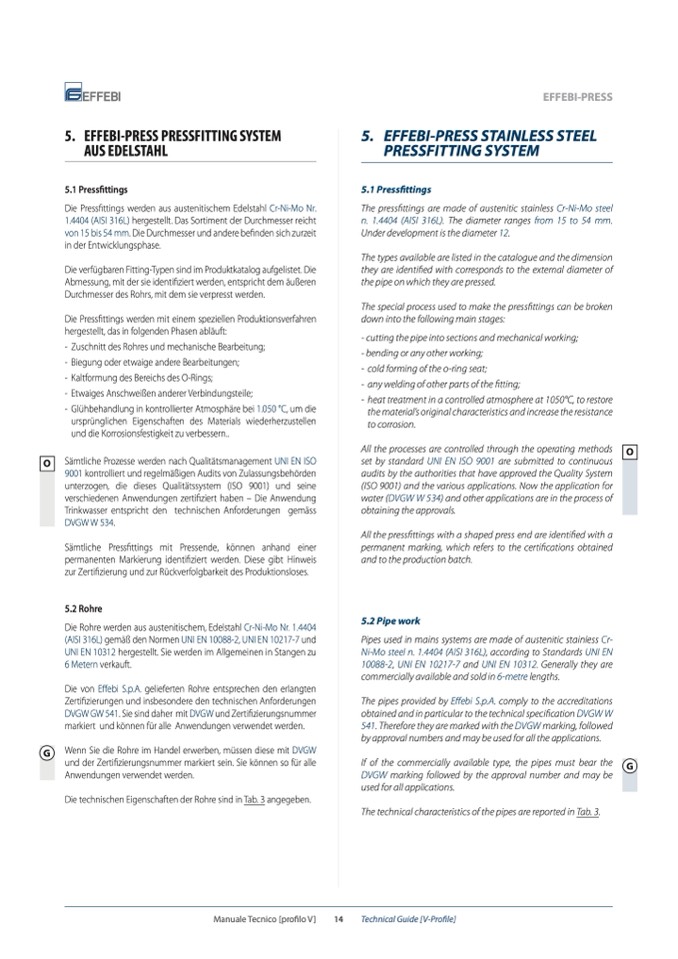
O
O
G
5. EFFEBI-PRESS PRESSFITTING SYSTEM
AUS EDELSTAHL
5.1 Pressfittings
Die Pressfittings werden aus austenitischem Edelstahl Cr-Ni-Mo Nr.
1.4404 (AISI 316L) hergestellt. Das Sortiment der Durchmesser reicht
von 15 bis 54 mm. Die Durchmesser und andere befinden sich zurzeit
in der Entwicklungsphase.
Die verfügbaren Fitting-Typen sind im Produktkatalog aufgelistet. Die
Abmessung, mit der sie identifiziert werden, entspricht dem äußeren
Durchmesser des Rohrs, mit dem sie verpresst werden.
Die Pressfittings werden mit einem speziellen Produktionsverfahren
hergestellt, das in folgenden Phasen abläuft:
- Zuschnitt des Rohres und mechanische Bearbeitung;
- Biegung oder etwaige andere Bearbeitungen;
- Kaltformung des Bereichs des O-Rings;
- Etwaiges Anschweißen anderer Verbindungsteile;
- Glühbehandlung in kontrollierter Atmosphäre bei 1.050 °C, um die
ursprünglichen Eigenschaften des Materials wiederherzustellen
und die Korrosionsfestigkeit zu verbessern..
Sämtliche Prozesse werden nach Qualitätsmanagement UNI EN ISO
9001 kontrolliert und regelmäßigen Audits von Zulassungsbehörden
unterzogen, die dieses Qualitätssystem (ISO 9001) und seine
verschiedenen Anwendungen zertifiziert haben – Die Anwendung
Trinkwasser entspricht den technischen Anforderungen gemäss
DVGW W 534.
Sämtliche Pressfittings mit Pressende, können anhand einer
permanenten Markierung identifiziert werden. Diese gibt Hinweis
zur Zertifizierung und zur Rückverfolgbarkeit des Produktionsloses.
5.2 Rohre
Die Rohre werden aus austenitischem, Edelstahl Cr-Ni-Mo Nr. 1.4404
(AISI 316L) gemäß den Normen UNI EN 10088-2, UNI EN 10217-7 und
UNI EN 10312 hergestellt. Sie werden im Allgemeinen in Stangen zu
6 Metern verkauft.
Die von Effebi S.p.A. gelieferten Rohre entsprechen den erlangten
Zertifizierungen und insbesondere den technischen Anforderungen
DVGW GW 541. Sie sind daher mit DVGW und Zertifizierungsnummer
markiert und können für alle Anwendungen verwendet werden.
Wenn Sie die Rohre im Handel erwerben, müssen diese mit DVGW
und der Zertifizierungsnummer markiert sein. Sie können so für alle
Anwendungen verwendet werden.
Die technischen Eigenschaften der Rohre sind in Tab. 3 angegeben.
EFFEBI-PRESS
5. EFFEBI-PRESS STAINLESS STEEL
PRESSFITTING SYSTEM
5.1 Pressfittings
The pressfittings are made of austenitic stainless Cr-Ni-Mo steel
n. 1.4404 (AISI 316L). The diameter ranges from 15 to 54 mm.
Under development is the diameter 12.
The types available are listed in the catalogue and the dimension
they are identified with corresponds to the external diameter of
the pipe on which they are pressed.
The special process used to make the pressfittings can be broken
down into the following main stages:
- cutting the pipe into sections and mechanical working;
- bending or any other working;
- cold forming of the o-ring seat;
- any welding of other parts of the fitting;
- heat treatment in a controlled atmosphere at 1050°C, to restore
the material’s original characteristics and increase the resistance
to corrosion.
All the processes are controlled through the operating methods
set by standard UNI EN ISO 9001 are submitted to continuous
audits by the authorities that have approved the Quality System
(ISO 9001) and the various applications. Now the application for
water (DVGW W 534) and other applications are in the process of
obtaining the approvals.
All the pressfittings with a shaped press end are identified with a
permanent marking, which refers to the certifications obtained
and to the production batch.
5.2 Pipe work
Pipes used in mains systems are made of austenitic stainless Cr-
Ni-Mo steel n. 1.4404 (AISI 316L), according to Standards UNI EN
10088-2, UNI EN 10217-7 and UNI EN 10312. Generally they are
commercially available and sold in 6-metre lengths.
The pipes provided by Effebi S.p.A. comply to the accreditations
obtained and in particular to the technical specification DVGW W
541. Therefore they are marked with the DVGW marking, followed
by approval numbers and may be used for all the applications.
If of the commercially available type, the pipes must bear the
DVGW marking followed by the approval number and may be
used for all applications.
The technical characteristics of the pipes are reported in Tab. 3.
G
Manuale Tecnico [profilo V]
14
Technical Guide [V-Profile]

